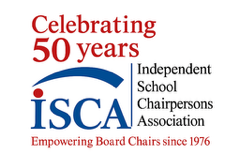Designing the Path Forward
The Board’s Role In Leading With Strategy
ISCA Annual Governance Conference
February 10, 2026
12:00 – 4:00 pm ET
Session Descriptions
Why We Plan: Strategic Planning that Drives Real Change
Nishant Mehta, Founder and President, Mehta Cognition
Independent school boards face a distinct challenge: governing organizations where mission is clear but competitive advantage is not, where stakeholders are many and patience is limited, and where the pressure to add new programs often drowns out the discipline to subtract outdated ones.
This keynote by Nishant Mehta, Founder and President of MehtaCognition, explores what strategy actually is—and why it requires different thinking than the strategic planning most schools have experienced. Participants will examine why culture shapes strategy more than strategy shapes culture, what distinguishes governance decisions (what to pursue) from operational decisions (how to execute), and how boards can tell whether their strategic work is creating real change or just sophisticated brochures.
Board chairs will leave with clarity about when strategic planning is the right tool, what questions boards and heads must answer together, and how to build the institutional courage that makes effective strategy possible.
What Good Looks Like: Planning for Distinction and Relevance
Moira Kelly, President, EXPLO
This session examines the essential elements of a high-quality strategic planning process. It begins with establishing a shared understanding of the current state – both within the school and in the external environment. Participants will explore how boards and heads structure their work to integrate an “inside-out” understanding of the school’s identity and values with an “outside-in” analysis of market forces and demographic shifts.
The session addresses purposeful stakeholder engagement and the decision-making steps that distinguish genuine strategic choices from operational imperatives. Participants will explore the characteristics of a strong strategic plan, including clear strategic options that create distinctive positioning, alignment with mission and vision, resource realism, and mechanisms for monitoring both operational health and strategic relevance.
This session provides a practical framework for recognizing what “good” looks like and strengthening planning efforts that ensure your school remains both true to its mission and responsive to a changing educational landscape.
Putting it into Practice: Practical Steps to Assess Your Current Plan and Plan for a New One
Crystal Land and Antonio Viva, Partners, Leadership + Design
Whether your school is reviewing an existing strategic plan or preparing to begin a new planning cycle, this session helps boards focus on the most important work that comes before timelines and tools. Participants will explore how to assess their previous planning efforts to evaluate effectiveness, discuss the difference between strategy and planning, and create guiding questions to clarify what a strategic plan should ultimately enable for their school. We will also define appropriate board and leadership roles in order to make both process and product meaningful. The session offers practical decision-making frameworks to help schools initiate a planning process that is mission-aligned, future-oriented, and responsive to real institutional conditions.
Strategy in Motion – Case Studies of Strategic Plans Driving Leadership and Governance
Discussion featuring Drew School, San Francisco, CA; Heronfield Academy, Hampton Falls, NH; and High Meadows School, Roswell, GA
This concluding session brings the conference themes to life through real strategic planning case studies. Each school will share how a strategy-rooted planning process shaped their strategic priorities, guided leadership decision-making, and informed tactical planning across the institution. Panelists will discuss how they structured their planning process, how the resulting strategic plan created coherence and focus, how they monitored progress, and how strategy provides a framework for adapting to challenges or opportunities that arise. Through these real-world examples, participants will see how disciplined, strategy-led planning can drive meaningful outcomes, strengthen board–head partnership, and support long-term institutional success.
